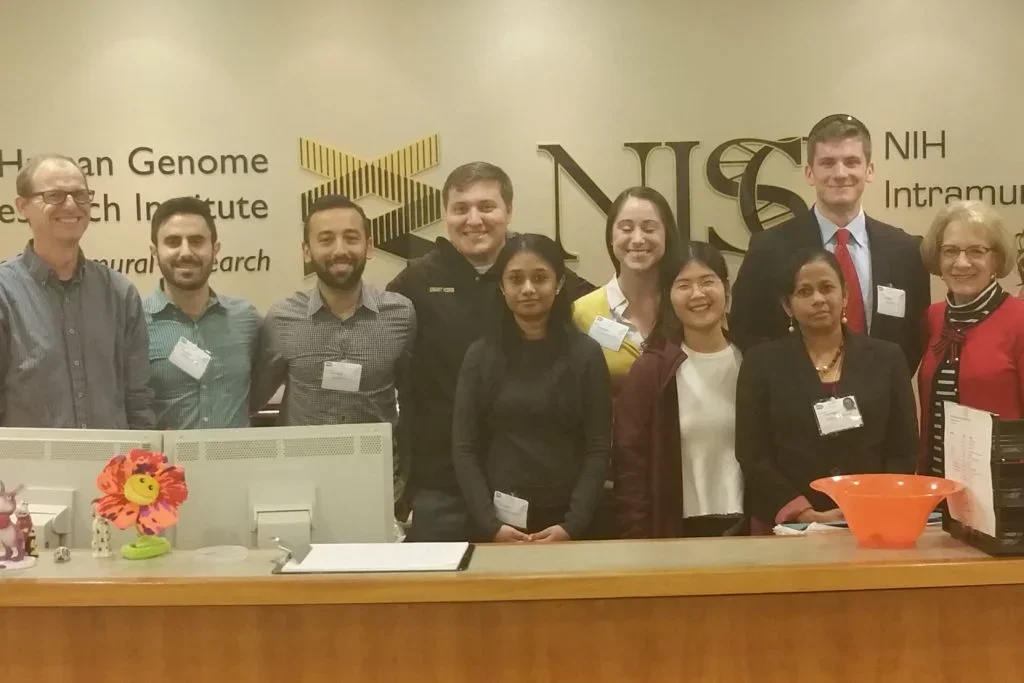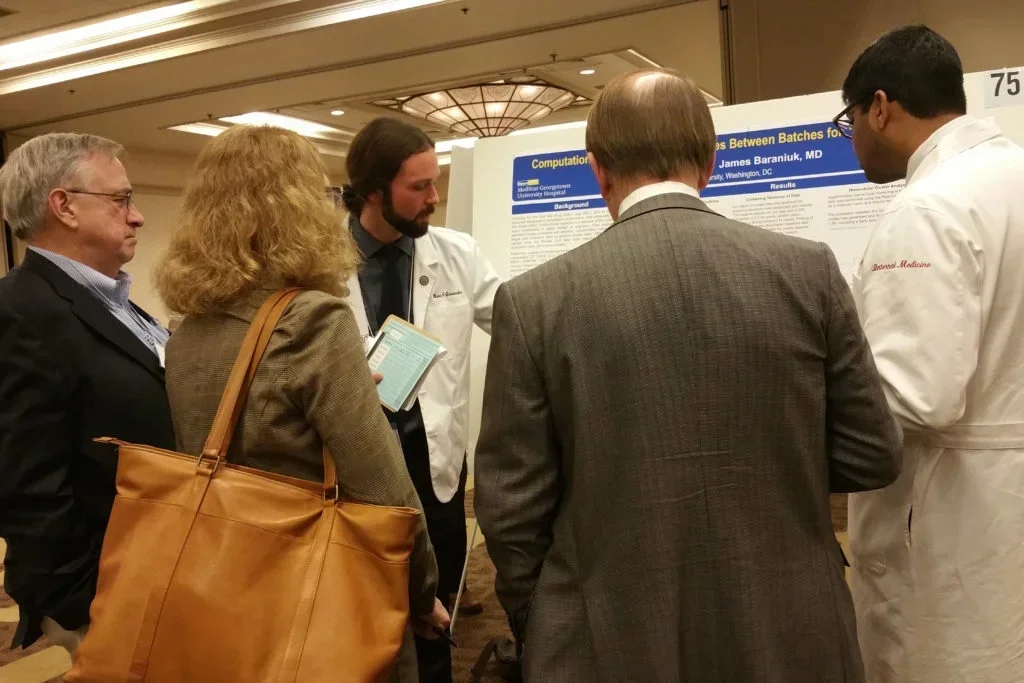What Is Systems Medicine?
- Who Is Systems Medicine For?
- Systems Medicine at Georgetown
- What Makes Us Unique
- What Our Alumni Say About Us
- What Experts Say About Us
Systems medicine is an emerging interdisciplinary biomedical field that bridges research disciplines and personalizes clinical care.
With advances in molecular biology and the sequencing of the human genome, biomedicine is being transformed and is becoming an increasingly quantitative science requiring the understanding and use of complex computational tools.
In medicine, complex computational tools will become essential for deriving personalized assessments of disease risk and management including individualized diagnosis, prognosis, and treatment options. This change, involving the use and analysis of enormous quantities and variety of data, will require a new type of physician and a new type of biomedical scientist – one with a grasp of modern computational sciences, “-omic” technologies (genomics, proteomics, metabolomics, transciptomics etc.), and a systems approach to medicine.
Who Is Systems Medicine For?
Have you ever encountered or wondered about any of these scenarios?
- How can two people go out to dinner and have the same meal, and only one of them ends up in the emergency room with food poisoning?
- How could two boys with the same genetic mutation have such different degrees of disease, with one ending up in a wheelchair at a young age and the other remaining highly mobile?
- Why do some people never get Covid? Why do some people with Covid die, even though they don’t have any underlying comorbidities?

Do you want to change the way medicine is practiced? Do you want to carry out data-driven research that can help you understand and investigate the “Why” in the above scenarios? Do you want to help find the right treatment for the right person at the right time, as a physician or a researcher or a data analyst?
If you answered yes, then you are in the right place! The Georgetown University M.S. in Systems Medicine is a perfect fit for you.

Joining this program has been like becoming a part of a welcoming and nurturing family, and I wholeheartedly encourage aspiring students to consider the value that comes with participating in such a groundbreaking and transformative field.
Kylan Kelley (’23)
What Our Alumni Say About Us
Systems Medicine at Georgetown
The Georgetown Systems Medicine program provides proficiency in computational sciences, data analysis, and the application of “‑omics” technologies to any biomedical or clinical challenge.
New tools for clinicians and biomedical scientists will continue to arise from the intersection of research across a variety of disciplines. As a leader in medical science and education, Georgetown University Medical Center is taking a leadership role in developing graduate and medical curricula and expanding research in this area.

Recognizing that success in this discipline will require unique training, Professor Sona Vasudevan established the first graduate program in Systems Medicine, which offers the unique educational experiences required for expertise in this growing field.
Joseph Loscalzo, M.D., Ph.D., Brigham and Women’s Hospital, Harvard Medical School
What Experts Say About Us
What Makes Us Unique
As the only program of our kind, we stand out for our focus as well as for the resources and opportunities we offer students.
Integrative Curriculum: Our entire curriculum is focused on the integration of computational sciences and “-omics” technologies, based on systems biology principles.

Practical Experience: Our program offers practical training components such as internships, research projects, and collaborations with industry partners, health care providers and leading scientists.
Facilities and Resources: Students enjoy access to specialized informatics facilities and to laboratories with cutting-edge technologies, computational resources and bioinformatics tools. They gain experience in applying computational tools and systems approaches to real-world scenarios and problems.
Faculty Expertise: Our faculty are world leaders who are highly accomplished in their respective fields. Their backgrounds include computational sciences, systems biology, policy, entrepreneurship, engineering, statistics, biomedical and clinical research.

Individualized Advising: As a Georgetown Systems Medicine student, you will get one-on-one attention from faculty and mentorship from the program director, who will personalize your academic journey and support you in meeting your career goals.
GPA Boost: If you are willing to work hard, you are guaranteed to get a great boost. The program director works with you to make sure this happens for you!
Career Prospects: Graduates choose a variety of career paths including medical school, PA school, nursing, Ph.D.s, research assistants, data analysts, bioinformaticians, clinical coordinators, curators, software engineers, consultants, regulatory and policy experts, and data scientists. They play specific roles in personalized medicine, biomedical research, pharmaceutical companies, health care consulting, and academia. Explore our alumni’s career outcomes >
What Our Alumni Say About Us

“Joining this program has been like becoming a part of a welcoming and nurturing family, and I wholeheartedly encourage aspiring students to consider the value that comes with participating in such a groundbreaking and transformative field. This program has been an incredible opportunity that I highly recommend to anyone looking to further their academic and professional aspirations.
“The program director, Dr. V, has been an amazing mentor who genuinely cares about her students’ success during and after the program. She takes a personal interest in each student, understanding our strengths and weaknesses, and provides tailored guidance to help us reach our full potential. Her dedication and support have been instrumental in shaping my academic and professional journey.”
— Kylan Kelley (M.S. ’23)
What Experts Say About Us

“Systems medicine is a rapidly growing discipline that promises to identify key biological mechanisms, pathogenic processes, and therapeutic approaches to the complexity of human biology and disease. In conjunction with the related discipline of network medicine, systems medicine has already made considerable progress in meeting these key goals.
“In essence, systems medicine turns the conventional reductionist paradigm of biology and medicine on its head, recognizing the complex holistic interplay among many interacting molecular components that govern phenotype and pathophenotype and utilizing modern genomic and analytical mechanisms to dissect those complexities.
“Recognizing that success in this discipline will require unique training, Professor Sona Vasudevan established the first graduate program in Systems Medicine, which offers the unique educational experiences required for expertise in this growing field. Since 2011, she has cultivated the growth of trainees in this discipline, populating programs in academics and industry as a result. Her efforts continue to be recognized internationally, as witnessed by the success of the recent International Conference in Systems Medicine that she organized at Georgetown. Professor Vasudevan’s efforts are both widely recognized and greatly appreciated, as the academic workforce needed to advance this discipline requires the commitment she demonstrates and rigor the program offers essential for success.”
— Joseph Loscalzo, M.D, Ph.D
Chair of Department of Medicine and Physician-in-Chief
Brigham and Women’s Hospital
